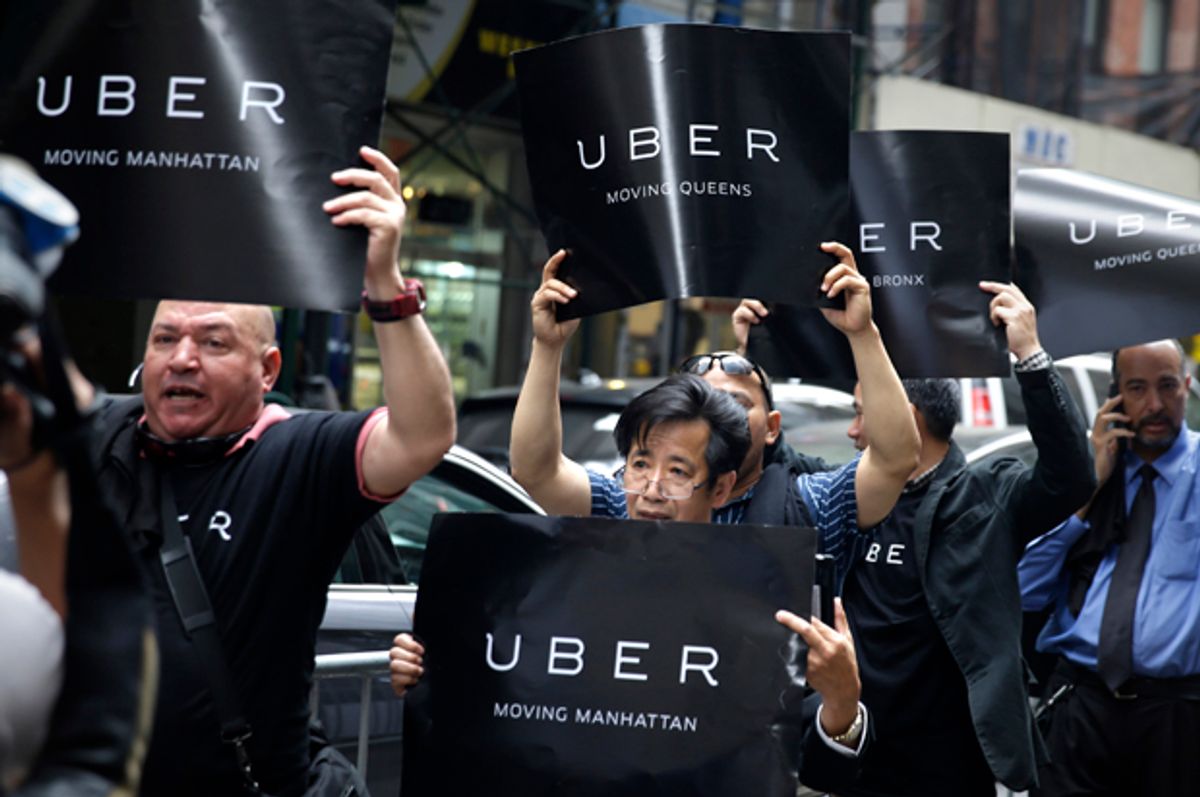In American society, the concept of progress, the idea that life is always getting a little bit better, is both highly influential and exceedingly ill-defined. And while it is often credited for social changes most of us support (like patent racism and homophobia becoming taboo) the truth is that progress has no agenda. Like any other tool, it’s only as good or as bad as the person wielding it.
I am an American with a weakness for being contrary, so this skeptical view of progress has long appealed to me. But as I watched on Wednesday as one celebrity tweeter after another attacked New York Mayor Bill de Blasio for trying to cap the number of Uber drivers allowed in the city, I realized something: The problems with progress had floated from my daydreams and into the real world.
For example, check out the tweet that the actor Jared Leto sent to hizzoner on Wednesday in defense of Uber:
[embedtweet id=623934639896276992]
Now, when it comes to the fight between de Blasio and Uber, I’m inclined to join Harry Siegel and choose “neither.” As he put it in a good piece for the Daily News, “There’s no good guy here. Medallion owners vs. Uber is real-life Alien vs. Predator: Whoever wins, we lose.” But let’s table that and simply focus on Leto’s tweet, because whether or not you agree with its sentiment, it’s a good example of why the sword of progress can be double-edged.
Leto hasn’t exactly distinguished himself through his intellect or firm grasp of politics. But even if he’s sillier than the average person, the way his tweet conflates two very different understandings of progress isn’t unique. First he chastises the avowedly progressive de Blasio for not being “forward thinking”; but then he implies that to regulate Uber as the mayor wanted would “kill progress.” Like much of Leto’s Twitter feed, the tweet sounds good while simultaneously making no sense.
When it comes to American politics, “progress” has no set definition. But it is usually associated with figures who in another era would’ve been called “liberal.” Progressives are almost always supportive of LGBT rights, feminism and the sexual revolution; and that’s forward-thinking in its way. But when de Blasio (or most anyone else) calls himself a progressive, he isn’t claiming to be a man of the future. He’s merely signaling to voters that his ideal government is hands-off on sexuality but supportive of the welfare state.
It shouldn’t be necessary to point this out, but there’s nothing about that version of progress that requires de Blasio be nice to Uber. The kind of progress that Uber represents (which is technological, not social or political) has nothing to say about civil rights or redistribution. It doesn’t have a point of view; it just is. But because we use the same word for two different concepts, many of us assume — often unconsciously — that political and technological progress always walk hand-in-hand.
If you take a look at American history, though, it’s pretty obvious that this is not the case. In fact, it’s not that unusual for technological progress to function in a way that is against political progress’s interests. Think of all the former travel agents and grocery store cashiers and Blockbuster clerks who lost their jobs because of new technology. Many of them had to fight just to regain their previous standard of living. It’s hard to imagine that “progress” was on their mind as they waited for their unemployment check.
You can find an even more upsetting example of the dynamic in our history if you wind the clock farther back. Right before the beginning of the 19th century, when the United States were young, the future of chattel slavery in the South was uncertain. White supremacy was hegemonic, of course; but for many Southerners, it wasn’t clear that slavery was worth it, economically. For this reason and others, people at the time could imagine a not-so-distant future when American slavery had simply faded away.
Unfortunately, that’s when technological progress stepped in. In 1794, a man named Eli Whitney patented what came to be known as the “cotton gin.” Growing cotton had previously been less than enticing. The amount of time it took for slaves to divide cotton seeds and cotton fibers by hand was considerable. And that meant that cotton itself was expensive, making it an even riskier investment that it was already. The new technology of the cotton gin changed all that.
Thanks to the cotton gin, which separated the fiber and seeds itself, the amount of time it took to get cotton ready for the market was slashed. And because it was no longer so expensive for slavers to produce, the cost of cotton goods plummeted. Goods that were once reserved for the well-off were now available for commoners, and more and more slave-masters decided to change their business plan and start growing cotton. Before Whitney, there were about 700,000 slaves in America; by 1850, that number was in excess of 3 million.
In terms of their moral implications, there’s no comparison between the cotton gin and Uber. Although Uber CEO Travis Kalanick has a reputation for being an asshole, I have no intention to compare him to a slavedriver in the antebellum South. My point, rather, is that the relationship between political and technological progress can be complicated. That’s the reality Uber tried to obscure on Wednesday. And until it stops working, they’re going to do it over and over again.



Shares